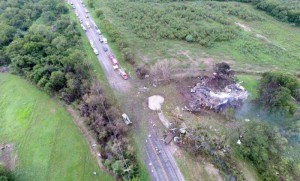A 69-year-old woman was killed as the result of a crash and subsequent explosion involving a truck carrying airbag inflators and the explosive ammonium nitrate used in those devices that was bound for a Takata Corp. warehouse in Eagle Pass, Texas.
Takata is the Japanese airbag supplier whose faulty inflators have so far been blamed for at least 14 deaths worldwide. That has triggered the recall of about 50 million inflators in the U.S. and more than 100 million worldwide.
The incident occurred last week on U.S. Highway 277 not far from the Southern Texas Takata plant when the truck, operated by a contractor, was involved in a crash. The driver, 20-year-old Mario Alberto Rodriguez, and a passenger were able to escape before the vehicle caught fire and exploded. But the inferno that touched off damaged or destroyed a number of nearby homes, including one in which victim Lucila Robles was living.
Rubble from the truck was later found as much as a mile from the site of the crash.
“Takata immediately deployed personnel to the site and has been working closely with the subcontractor and the appropriate authorities to investigate this incident,” the company said in a statement that also insisted it has “strict safety procedures…that meet or exceed all regulatory requirements.”
(Are your car’s airbags too old to be safe? Click Here for that special report.)
The incident comes as a further, embarrassing setback for the Japanese airbag manufacturer which is struggling to remain financially solvent as a result of its ongoing recall problems.
The truck was on its way from a factory in Monclova, Mexico. That facility has been identified as one of the two North American sources for faulty airbag inflators blamed for at least 14 deaths worldwide. According to government and industry studies, a design flaw, along with manufacturing errors, makes certain Takata airbags vulnerable to exposure to high heat and humidity. The ammonium nitrate used in the inflators can also break down over time, even in drier, cooler climates.
The chemical is extremely volatile, even in the best of conditions. Ammonium nitrate – which can be created easily using fuel and fertilizer – was used by terrorist Timothy McVeigh to blow up the Murrah Federal Building in Oklahoma City in 1995, killing 168 people.
Specific details of the inflators onboard the truck involved in the Texas crash have not been released by Takata, but the supplier has been racing to produce as many of the devices as possible to replace those covered by recall.
(Dealers are the latest to settle with VW over diesel scandal. Click Here for the latest.)
Last October, the National Highway Traffic Safety Administration targeted 27 million vehicles using Takata inflators. It added another 50 million inflators to the list earlier this year. The specific number of vehicles that will cover isn’t clear, as some use multiple Takata airbags. But the final figure is expected to reach 50 million or more vehicles in the U.S. and 100 million worldwide.
The supplier has modified its design to use a desiccant, a chemical that absorbs moisture, to reduce the likelihood of failure. But Takata also continues to ship a small number of the original inflator design, some still being used in new vehicles, according to a recent U.S. Senate report.
Data released by NHTSA shows that Takata airbags dating back to 2001 to 2003 have been found to have a failure rate of more than 50%, but even newer ones can malfunction. If that happens, the bags may inflate over-aggressively, sending shrapnel spewing into the passenger compartment.
(Jury again sides with GM in ignition switch crash case. Click Here for more.)



Ah, NAFTA – the gift that keeps on giving.